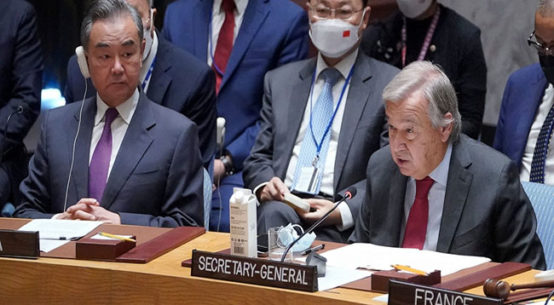
The first day of Ramadan came and went in Gaza, with residents marking a joyless iftar against a backdrop of famine, disease and displacement as the war in the besieged territory ground on more than five months after it began.
As the Muslim world welcomed the start of the holy month on Monday, Gazans faced continued Israeli bombardments and a spiralling humanitarian crisis.
With the flow of food and other assistance slowed to a trickle, a UN report citing the territory’s Hamas-run health ministry said 25 people have now died from malnutrition and dehydration, most of them children.
In Gaza’s southern border city of Rafah, where 1.5 million people have sought refuge, the usual generous iftar meal marking the end of the day’s fast was replaced by “canned food and beans”, said displaced Khan Yunis resident Mohammad al-Masry.
“We didn’t prepare anything. What do displaced people have?” al-Masry said.
“We don’t feel the joy of Ramadan… Look at the people staying in tents in the cold.”
Om Muhammad Abu Matar, also displaced from Khan Yunis, told AFP that this year, Ramadan had “the taste of blood and misery, separation and oppression”.
Aid groups have been warning of the risk of famine in Gaza for weeks, and the United Nations has reported particular difficulty in accessing the territory’s north for deliveries of food and other aid.
“We are running out of time,” Cindy McCain, head of the World Food Programme (WFP), said Monday. “If we do not exponentially increase the size of aid going into the northern areas” of Gaza, she said, “famine is imminent”.
UN Secretary-General Antonio Guterres called Monday for “silencing the guns” during the Muslim holy month and said he was “appalled and outraged that conflict is continuing”.
In Gaza City, surrounded by collapsed buildings, one family gathered around a table next to the ruins of their home to break the fast on Monday.
“Today is the first day of Ramadan. We decided to come and break the fast here in our home that was struck, despite the destruction and the rubble,” said Om Shaher Al Qta’a.
Earlier in the day, Zaki Abu Mansour told AFP in Rafah that his last meal before the fast began had been meagre, and he didn’t know what his next one would be.
“Here’s my kitchen,” the displaced Khan Yunis resident added, gesturing to a corner of his tent. “I have only a tomato and a cucumber — that’s all I have, and I have no money to buy anything.”
With aid entering Gaza by truck far below pre-war levels, and Gazans increasingly desperate, foreign governments have turned to airdrops and are now trying to open a maritime aid corridor from Cyprus.
A senior US administration official has said the Cyprus initiative provides a platform at the port of Larnaca for “screening by Israeli officials of Gaza-bound goods”.
The cumbersome screenings are a major reason current shortages are so glaring, aid workers say, though Israel blames problems on the Palestinian side.
The United States and other countries again airdropped supplies into northern Gaza on Monday, but aid workers have said land deliveries would be much more effective.
The October 7 Hamas attack that started the war resulted in about 1,160 deaths in Israel, mostly civilians, according to an AFP count based on Israeli official figures.
The Hamas also took around 250 hostages, dozens of whom were released during a week-long truce in November. Israel believes 99 hostages still in Gaza remain alive and 31 have died.
Israel’s retaliatory bombardment and ground offensive has killed 31,112 Palestinians, mostly women and children, according to Gaza’s health ministry.
Rear Admiral Daniel Hagari, Israel’s military spokesman, on Monday said a weekend air strike on an underground compound in central Gaza had targeted Marwan Issa, deputy head of Hamas’s armed wing, though it was unclear if he was killed.
Israel on Monday also carried out strikes against Hamas ally Hezbollah deep inside Lebanese territory, with the governor of the local Baalbek-Hermel region saying one man had been killed.
The Israeli military later confirmed its jets had hit two sites in the area “in retaliation to Hezbollah aircraft attacks launched towards the Golan Heights”.
Weeks of talks involving US, Qatari and Egyptian mediators failed to bring about a truce and hostage exchange deal ahead of Ramadan.
Israeli Prime Minister Benjamin Netanyahu is under pressure from desperate families of hostages as well as critics of his government, and has also come in for increasingly sharp criticism from key backer the United States.
Asked about the apparent friction between him and US President Joe Biden, Netanyahu said in an interview with Fox News on Monday that “we have our agreements on the basic goals, but we also have disagreements on how to achieve them”.
“Ultimately, it’s Israel that has to decide. Our neck is on the line… I’m telling you that we’re not getting off the gas.”
Netanyahu has steadfastly insisted since the start of the war that Israel will press on until Hamas has been eradicated.
But in an annual threat assessment report released Monday, US national security officials suggested that goal would be difficult to achieve, predicting Israel would likely “face lingering armed resistance from Hamas for years to come”.


